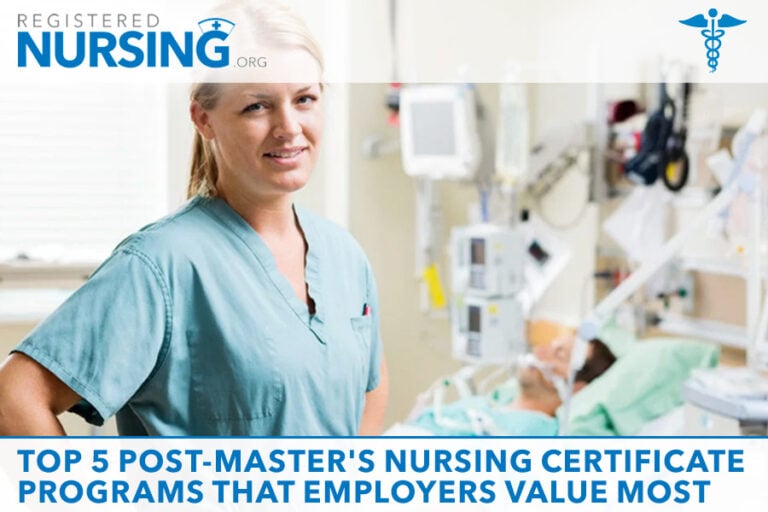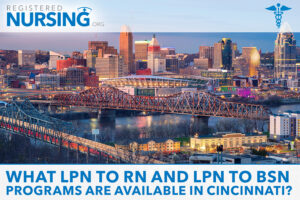Top 5 Post-Master’s Nursing Certificate Programs That Employers Value Most
- Strategic Specialization in Advanced Nursing
- 1. Psychiatric-Mental Health Nurse Practitioner (PMHNP)
- 2. Family Nurse Practitioner (FNP)
- 3. Acute Care Nurse Practitioner (ACNP) – Adult-Gerontology
- 4. Nurse Educator with Simulation Specialty
- 5. Nurse Leadership and Nursing Administration
- Making the Right Choice: Personal Factors to Consider
- Investing in Strategic Specialization
- Frequently Asked Questions
- Latest Articles & Guides

Strategic Specialization in Advanced Nursing
Nursing post-master’s certificates offer a streamlined educational pathway for master’s-prepared nurses seeking to enhance their marketability, expand their scope of practice, or pivot into high-demand specialties. Unlike pursuing a second graduate degree, these focused programs allow nurses to acquire specialized credentials in approximately 12-24 months, often while maintaining their current positions.
However, not all post-master’s certificates deliver equal value in the healthcare marketplace. As healthcare systems face evolving challenges—from population health management to mental health integration and telehealth expansion—certain specializations have emerged as particularly valuable to employers.
This comprehensive guide examines the five post-master’s nursing certificate programs that consistently rank highest in employer demand, compensation potential, and career advancement opportunities in today’s healthcare landscape.
1. Psychiatric-Mental Health Nurse Practitioner (PMHNP)
The nationwide mental health crisis has created unprecedented demand for psychiatric-mental health specialists across all healthcare settings. Learn more about PMHNP post-master’s certificates:
Why Employers Value This Certification
The PMHNP certification allows nurses to assess, diagnose, and treat mental health conditions across the lifespan. For healthcare organizations, PMHNPs represent a solution to multiple challenges:
- Addressing provider shortages in behavioral health services
- Integrating mental health into primary care settings
- Expanding telehealth mental health services
- Managing complex patients with both physical and psychiatric comorbidities
Program Structure
Typical PMHNP post-master’s certificates include:
- Psychopharmacology coursework
- Psychotherapeutic modalities training
- 500-600 supervised clinical hours
- Comprehensive psychiatric assessment techniques
Career Impact
MSN-prepared nurses who add PMHNP certification can expect:
- Salary increases of $25,000-$40,000 annually
- Expanded practice authority in most states
- High employability across multiple settings
- Opportunities for independent practice (state-dependent)
2. Family Nurse Practitioner (FNP)
The versatility of the FNP certification makes it consistently valuable across healthcare environments, from rural primary care to urban health systems. Learn more about FNP post-master’s certificates:
Why Employers Value This Certification
FNPs provide comprehensive primary care across the lifespan, offering organizations:
- Workforce flexibility to serve diverse patient populations
- Cost-effective primary care delivery compared to physician-only models
- Expanded access in underserved communities
- Continuity of care across developmental stages
Program Structure
FNP post-master’s certificates typically include:
- Advanced health assessment across the lifespan
- Primary care management courses
- 650-750 supervised clinical hours
- Chronic disease management training
Career Impact
Adding FNP certification to an MSN can result in:
- Salary increases of $20,000-$35,000 annually
- Broad employability in virtually any geographic region
- Leadership opportunities in primary care initiatives
- Strong position for emerging value-based care models
3. Acute Care Nurse Practitioner (ACNP) – Adult-Gerontology
As hospital systems manage increasingly complex patient populations, ACNPs have become essential team members in acute and critical care environments. Learn more about Adult-Gerontology Acute Care NP post-master’s certificates:
Why Employers Value This Certification
ACNPs specialize in managing acutely ill patients, providing organizations with:
- Advanced clinical management of complex, unstable patients
- Continuity across transitions of care from ICU to step-down to discharge
- Procedure competency reducing reliance on other specialists
- 24/7 advanced practice coverage in hospital settings
Program Structure
ACNP post-master’s certificates typically include:
- Advanced pathophysiology in acute illness
- Complex pharmacology and interventions
- 600-700 supervised clinical hours in acute settings
- Procedural skills training
Career Impact
MSN-prepared nurses who add ACNP certification often experience:
- Salary increases of $25,000-$45,000 annually
- High demand in academic medical centers
- Opportunities in specialized intensive care units
- Potential for procedure-based billing revenue
4. Nurse Educator with Simulation Specialty
As nursing education evolves to meet complex healthcare needs, nurse educators with simulation expertise are increasingly sought after by both academic institutions and hospital systems. Learn more about Nurse Educator post-master’s certificates:
Why Employers Value This Certification
Nurse Educator certification with simulation specialty provides:
- Evidence-based education design for staff development
- Simulation program development for clinical competency assessment
- Quality improvement integration through simulated scenarios
- Risk reduction through team training for high-risk situations
Program Structure
These certificates typically include:
- Curriculum development and evaluation
- Simulation technology and methodology
- 300-400 supervised teaching practicum hours
- Assessment and evaluation techniques
Career Impact
Adding educator certification with simulation focus can lead to:
- Salary increases of $10,000-$25,000 annually
- Dual opportunities in academic and clinical settings
- Leadership roles in professional development departments
- Project leadership in quality improvement initiatives
5. Nurse Leadership and Nursing Administration
As healthcare organizations navigate complex regulatory, financial, and operational challenges, nurses with executive leadership preparation are increasingly valued at the administrative level. Learn more about Nurse Leadership post-master’s certificates and Nursing Administration post-master’s certificates:
Why Employers Value This Certification
Executive leadership certification equips nurses to:
- Lead strategic initiatives aligning clinical and business goals
- Manage financial performance of clinical service lines
- Implement evidence-based practice across systems
- Navigate regulatory compliance while optimizing operations
Program Structure
These certificates typically include:
- Healthcare finance and economics
- Strategic planning and implementation
- Quality improvement methodology
- Organizational leadership theory and application
Career Impact
MSN-prepared nurses who add executive leadership certification can expect:
- Salary increases of $30,000-$60,000+ in executive roles
- Pathways to Chief Nursing Officer positions
- Opportunities in healthcare consulting
- Expanded influence in organizational decision-making
Comparison of Top Post-Master’s Certificate Programs
| Certificate | Average Completion Time | Typical Clinical Hours | Average Salary Increase | Job Growth Projection (2023-2028) | Practice Setting Flexibility |
| PMHNP | 15-18 months | 500-600 hours | $25,000-$40,000 | 45% | High (outpatient, inpatient, telehealth, private practice) |
| FNP | 18-24 months | 650-750 hours | $20,000-$35,000 | 26% | Very High (all primary care settings, specialty clinics) |
| ACNP (Adult-Gero) | 15-18 months | 600-700 hours | $25,000-$45,000 | 22% | Moderate (primarily hospital-based) |
| Nurse Educator/Simulation | 12-15 months | 300-400 hours | $10,000-$25,000 | 17% | High (academic, hospital, corporate) |
| Nurse Leadership | 12-15 months | Project-based | $30,000-$60,000+ | 32% | High (all healthcare organizations) |
Making the Right Choice: Personal Factors to Consider
When selecting a post-master’s certificate program, consider:
- Alignment with career goals: Where do you see yourself in 5-10 years?
- Current clinical background: Which certificate builds most effectively on your experience?
- Geographic considerations: Are certain specialties more in demand in your region?
- Practice setting preferences: Hospital, clinic, academic, or corporate environment?
- Work-life considerations: Can you manage the clinical hour requirements?
Investing in Strategic Specialization
Post-master’s certificates represent a strategic investment in your nursing career, allowing you to pivot into high-demand specialties without the time and cost commitment of a second graduate degree. The five programs outlined above consistently deliver strong returns on investment through expanded practice authority, increased compensation, and enhanced career mobility.
By carefully aligning your selection with both market demands and personal career goals, you can maximize the impact of your educational investment and position yourself as a highly valuable specialist in today’s evolving healthcare landscape.
Frequently Asked Questions
How long does it typically take to complete a post-master’s certificate program?
Most post-master’s certificate programs require 12-24 months to complete, depending on the specialty and whether you attend full-time or part-time. Programs with extensive clinical hour requirements like FNP or ACNP typically take longer than education or leadership-focused certificates.
Can I complete a post-master’s certificate program while working full-time?
Yes, many programs are designed specifically for working professionals, offering evening/weekend courses, online learning components, and flexible clinical practicum arrangements. However, clinical hour requirements for NP specialties often require careful planning and may necessitate reducing work hours during certain semesters.
Will my current MSN specialization affect my eligibility for certain post-master’s certificates?
Some programs have prerequisites or expected background knowledge. For example, transitioning from a CNS to NP role may require additional foundational coursework, while moving between NP specialties (like FNP to PMHNP) might involve a more streamlined curriculum. Always check specific program requirements before applying.
Are online post-master’s certificate programs viewed as equivalent to in-person programs by employers?
Employers generally value accredited programs regardless of delivery format. For online programs, ensure they are accredited by CCNE or ACEN and offer quality clinical placement assistance. The reputation of the institution and your performance on certification exams typically matter more than the delivery format.
How soon after completing my MSN can I pursue a post-master’s certificate?
While there’s no mandatory waiting period, many programs prefer candidates with at least 1-2 years of practice experience in their initial MSN role. This experience helps you build the clinical judgment and specialized knowledge that will enhance your success in an advanced certificate program.
Latest Articles & Guides
One of the keys to success as a registered nurse is embracing lifelong learning. Our articles and guides address hot topics and current events in nursing, from education to career mobility and beyond. No matter where you are on your nursing journey, there’s an article to help you build your knowledge base.
Browse our latest articles, curated specifically for modern nurses.



